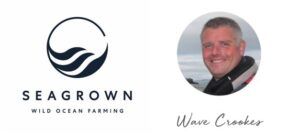- within Environment topic(s)
SeaGrown is a pioneering offshore kelp farming company based in Scarborough, and England's first large-scale commercial seaweed farm. A 2024 Earthshot Prize nominee, the company has grown since 2018 to employ over 20 people, using three vessels to farm a 65-66 acre site off the Yorkshire Coast. The harvested seaweed is used in a range of food and drink products, from animal feed to alcohol, as well as to produce biodegradable packaging. We spoke to Wave Crookes, who founded the company together with Professor Laura Robinson, about the company's journey to commercial success.

What led to you starting Seagrown?
The idea really started back in 2016. At that time I was working for the British Antarctic Survey as a navigator on a polar research ship, where I met Laura who had joined the ship in one of the science teams. Upon returning to the UK, we wanted to utilize our expertise and professional knowledge in marine operations, subsea operations and marine science to start a business – one that wouldn't require us to spend nine months each year in the dark and ice! Seaweed farming seemed a perfect fit as it uses the skills that we already had as well as delivering strong environmental benefits.
How did you go about starting the business?
Although we had skills in marine operations we still had to do a lot of research. I would say that probably the entire first year of the business was focused on researching why, how and where we should grow seaweed and what it could be used for.
Then unfortunately COVID hit and like everybody we had to delay some of our plans. However, prior to COVID we had managed to obtain our marine license, which meant we could still do some seaweed farming throughout the pandemic as well as continuing with our innovation and development.
You mentioned that seaweed seemed a perfect fit. Can you elaborate on that and what environmental benefits seaweed farming offers?
I used to be a commercial fisherman and seaweed seemed then to just be a smelly messy thing that gets in your way, but I didn't have to look for long in my research to find that it's actually got many different purposes.
Seaweed farming has numerous environmental advantages. It absorbs carbon dioxide from the atmosphere, releases oxygen into the water, removes excess nutrients, and creates artificial habitats, enhancing marine biodiversity.
Seaweed farming isn't new, but it delivers on a lot of the targets that governments and others are looking towards for climate protection. For example, it doesn't need fresh water, power, chemicals or pesticides. And it doesn't need land which is key.
Can you explain more about the potential uses of seaweed beyond environmental benefits?
Beyond its environmental benefits, seaweed can be used to produce biodegradable plastics, animal feeds, biochemicals, textiles and various industrial products. It addresses grand industrial challenges like food and energy security while offering suitable alternatives to these.
As an example, the 2022 Earth Shot prize winner Notpla, produce an alternative to plastic made from seaweed and plants. It is totally natural and biodegradable and can be used to create a range of packaging products. We see our role as supplying seaweed so that companies like Notpla can use it in innovative ways that will contribute to helping the climate crises.
We heard that you also produce food products. Can you tell us more about that?
Certainly! SeaGrown offers a range of food seasoning products all made from our seaweed. Seaweed is rich in vitamins and minerals, making it an excellent addition to a healthy diet. We also produce seaweed beer in collaboration with local brewery, Wold Top brewery.
What challenges do you face in offshore seaweed farming, and how did you overcome them?
Offshore farming presents many logistical challenges, such as equipment stability and weather resistance. We found from experience that the traditional farming methods just weren't suitable for offshore in the North Sea. So we had to go back to square one and reinvent the equipment from the ground up.
We developed a modular system that's efficient and resilient to use in open water environments such as the North Sea. It also uses a fraction of the equipment that you used to need. For example, whereas in the traditional method you might have needed 200 metres of line with a pattern of anchors and buoys on the surface, which meant you couldn't drive over it, our system works vertically. This means we only need one buoy and you can drive around the lines in any direction.
We see this as being particularly beneficial for flexibility. So, if people want to use the system around coral reefs, seagrass beds or even infrastructure like offshore energy, oil pipelines, and transmission cables, they can do so.
Do you have any plans to expand and commercialize this technology?
One of our aims is to scale up – to do that we're looking to obtain investment, but we're careful about selecting sources which are ethical with good environmental credentials.
In addition, we're looking to license our technology globally, enabling others to benefit from offshore seaweed farming. The UK government's support and our ongoing development efforts position us well to scale up and offer viable solutions to farmers worldwide.
Our operations create sustainable jobs, particularly in coastal areas where opportunities may be limited. By fostering a thriving blue economy, we aim to support local communities and contribute to global environmental goals.
What role would you say that innovation plays in SeaGrown's operations?
Innovation is at the core of our operations. We continuously refine our farming techniques, develop automated systems and collaborate with experts in marine biology and engineering to enhance efficiency and sustainability.
How does SeaGrown ensure its technology remains protected?
We prioritize patent and trade mark protection for our innovations and brands while fostering collaboration within the industry. Our goal is to make seaweed farming accessible to all, driving positive environmental and economic impacts globally.
Protection of our intellectual property allows us to do that by providing a platform for more investment and enabling us to license the technology to others who want to use it, whether they are large companies or smaller farmers in less affluent nations.
We worked with our IP attorneys at HGF to file an initial UK patent application for our original apparatus and system. We have been able to take advantage of accelerated processing of this application through the Green Channel, due to the environmental benefits of our technology. Since our system has worldwide utility, we filed a subsequent PCT (international application) to enable us to secure protection for our technology in other countries.
As our research has continued, we have ensured that appropriate protection is put in place for new innovations. For example, not long after our first patent application was filed we came up with quite a comprehensive re-design based on the core concepts but with a lot of improvements, focused on the on-deck handling and processing system. Our IP attorneys helped us to file some follow-on patent applications to protect those improvements. We're therefore making sure that our IP is aligned with the developments in the technology.
Establishing a brand was also important to us and the team at HGF has helped us to obtain trade mark registrations for our SeaGrown name & Logo as well as conducting clearance searches for any new names we may want to use on our products. This helps us ensure we are not infringing others in the sector. It also helps to attract investors and license the technology and brand to others in the future.
In what way has your intellectual property rights helped to attract investors and support your business?
We have found that intellectual property rights, including patents and trade marks, offer investors reassurance and value.
In my research I saw that the overwhelming majority of investment was going into processing and developing seaweed products but not in actually producing the seaweed itself. We felt from the beginning that having our IP protected would make us a more attractive proposition for future investors, as well as the IP being a valuable asset of the company. We've therefore found that protecting our IP is worth the investment at the early stages of the company, and as we continue to develop our product and business.
What do you see as the future prospects for SeaGrown and the seaweed farming industry generally?
There is definitely a huge gap at the moment that needs filling to allow us worldwide to grow enough seaweed and utilize it to its full potential. Our aim is to become a global leader in seaweed farming technology, driving innovation and sustainability. With growing interest and investment in seaweed-based products, the industry holds immense potential for addressing environmental and economic challenges.
One of the challenges facing the industry is that there are few, commercial scale and reliable accredited systems to exploit offshore areas for seaweed farming. What we are doing at SeaGrown is therefore of interest to many people, companies and countries.
So far we have spent a lot of time developing equipment on the mechanical side, but Laura and her team are also carrying out research on the seaweed itself. Going forwards we will be looking to develop this aspect further and as well as continuing to protect our hard work through IP rights.
Comment from HGF: SeaGrown's environmental ethos and goals makes them a very exciting company to work with. Their inventiveness, both in terms of technology and branding, has allowed them to carve out a unique space in the sector. As Wave has said, farming seaweed itself is nothing new, but farming it offshore and in the North Sea brings an entirely new set of challenges. By cleverly investing in their IP from an early stage, they have put themselves in a good position moving forwards as they look to secure further investment and to expand the use of the technology and branding through licencing.
For the latest IP news, updates, and discussion in the food and drink sector, head over to our Food & Drink+IP group: https://lnkd.in/gnYCr72X
The content of this article is intended to provide a general guide to the subject matter. Specialist advice should be sought about your specific circumstances.


